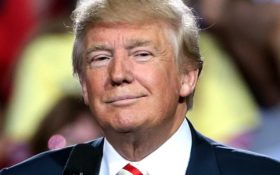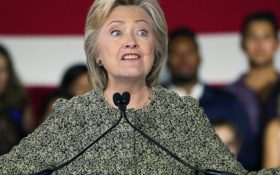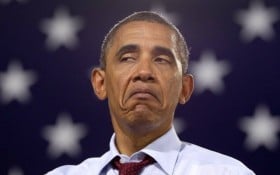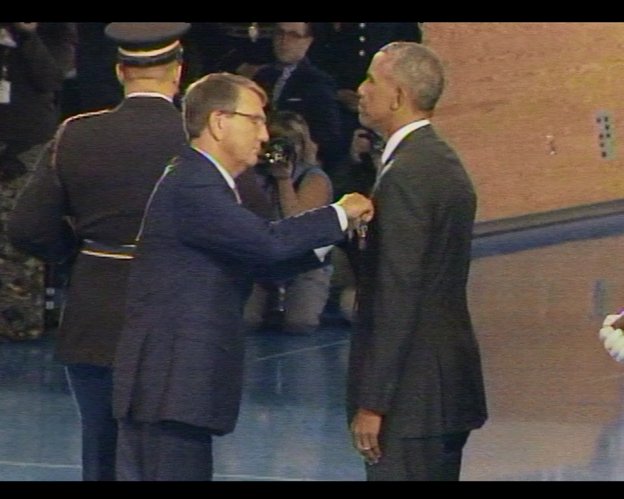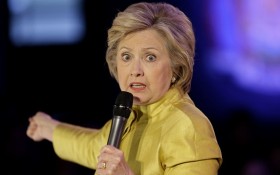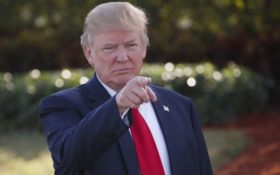
via:Newsmax
Donald Trump remains opposed to the megamerger between AT&T Inc.
and Time Warner Inc. because he believes it would concentrate too much
power in the media industry, according to people close to the
president-elect, who has been publicly silent about the transaction for
months.
Trump told a friend in the last few weeks that he still considers the
merger to be a bad deal, said one of the people, who asked not to be
identified because the conversation was private. Trump’s chief
strategist, Steve Bannon, is also opposed to the deal, another person
said.
While Trump blasted the deal during the campaign, Time Warner shares
have climbed 10 percent since the election on speculation that a
Republican administration would be friendlier to the $85.4 billion
merger. The stock closed Wednesday at $96.71, compared with AT&T’s
offer price of $107.50 a share.
Time Warner shares dropped as much as 3.8 percent Thursday after Bloomberg’s report on Trump’s thinking about the transaction.
Hope Hicks, a spokeswoman for Trump, didn’t respond to a request for
comment. AT&T declined to comment, and Time Warner didn’t respond.
Trump’s opposition to the deal is “mildly negative,” but everything
is negotiable with the president-elect, Cowen & Co. analyst Paul
Gallant said Thursday in a note to clients. The review process is still
in the very early stages, he said.
Limited Options
It remains unclear whether Trump would try to influence the
regulatory review of the merger, either by pushing officials to impose
conditions or to block the deal entirely. The transaction, which would
combine the biggest U.S. pay-TV and internet provider with one of the
largest creators of TV programming, will be reviewed by the Justice
Department and possibly by the Federal Communications Commission.
Trump, who takes office Jan. 20, has nominated Senator Jeff Sessions,
an Alabama Republican, to lead the Justice Department, and hasn’t named
a successor to departing FCC Chairman Tom Wheeler.
In October, before the election, Trump said his administration
wouldn’t approve the merger, saying, “It’s too much concentration of
power in the hands of too few.” He cited the deal as “an example of the
power structure I’m fighting.”
Trump has said little publicly about the deal since, but has taken on
several major corporations in recent weeks after winning the election,
including Ford Motor Co., Carrier and Boeing Co.
If Trump wants to influence the review, he would have more success
with the FCC, which weighs deals based on a more subjective
public-interest standard, said Craig Moffett, an analyst at
MoffettNathanson. In 2014, for instance, President Obama issued a
statement and video urging the commission to impose stronger regulations
on high-speed Internet service to protect “net neutrality,” which the
agency later did.
“If the FCC takes the case, President Trump could influence the
decision in any number of ways,” Moffett said. “He can effectively turn
up the heat and make it very difficult for the FCC to disagree with
him.”
AT&T, however, could avoid a FCC review by divesting licenses owned by Time Warner, Moffett said.
Trump would have a harder time influencing the Justice Department
review of the deal, because any decision the agency makes can be
challenged in court, Moffett said.
“It would be naive to say DOJ operates utterly without political
intervention,” he said, “but the potential for partisan meddling is much
lower at DOJ than at FCC.”
Trump’s opinion is unlikely to lead to the merger being blocked
unless the president chooses to get heavily involved in the approval
process, said Barry Diller, a media veteran who’s now chairman of
IAC/InterActiveCorp.
“Unless he’s going to micromanage and now he’s going to be head of
antitrust and go through the whole legal process, he’s just doing what
he does,” Diller said in an interview Thursday on Bloomberg Television.
CNN Frustration
Trump’s opposition to the AT&T-Time Warner deal stems partly from
his frustration with CNN, which is owned by Time Warner, one of the
people said. Trump has repeatedly criticized the cable news network for
what he sees as unfair coverage of him.
AT&T could sell CNN to appease Trump and get the deal approved, Moffett said.
“If that’s the primary concern, you’d have to wonder whether AT&T
wouldn’t prefer to sell CNN for Trump to claim victory and still get
this deal across the finish line,” Moffett said.
Trump is also frustrated with Comcast Corp., which in 2011 bought
NBCUniversal in a similar deal that was cleared with conditions. Trump
is upset with Comcast and NBC because he sees them as being responsible
for the October leak of a 2005 “Access Hollywood” video in which he made
degrading comments about women, the person said. Trump sees himself as a
victim of a concentrated media landscape, the person said.
In the coming months, federal regulators will scrutinize the deal,
which would create a telecommunications and media empire that will own
much of the programming it provides to subscribers of its wireless,
internet and pay-TV services. AT&T serves 133 million U.S. wireless
customers and 25 million video subscribers.
During a congressional hearing last month, the chief executives of
AT&T and Time Warner defended their transaction, arguing that it
would raise a challenge to cable companies by making it easier to create
new online TV packages and help them compete with tech giants in online
advertising, among other benefits.
That same month,
AT&T Chief Executive Officer Randall Stephenson said at an investor
conference that the regulatory review of the deal “should be fairly
straightforward” and “based on the facts of the law, we expect a good
outcome from that.”
He said AT&T was open to conditions to get the deal approved but
said “it’s too early to tell” whether AT&T would divest Time
Warner’s licenses to avoid an FCC review.
© Copyright 2017 Bloomberg News. All rights reserved.





